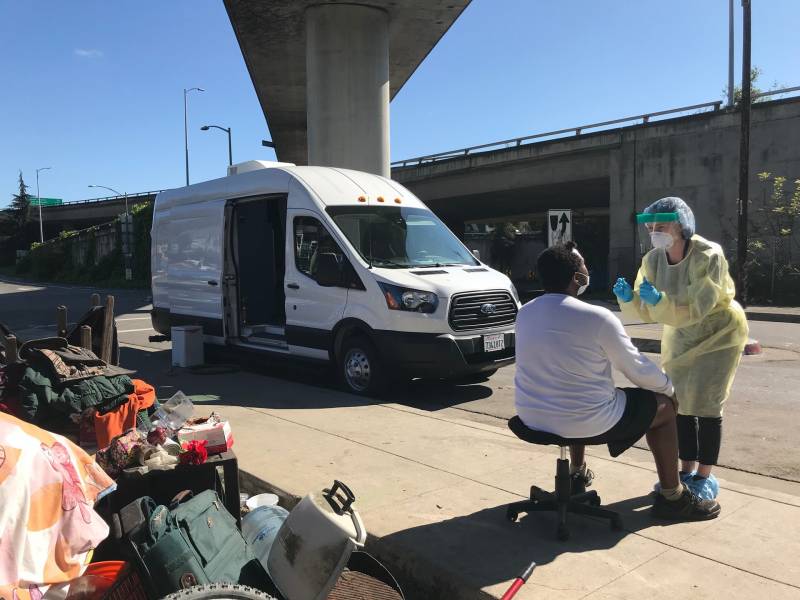The lessons learned in Alameda County can be applied throughout the state as more and more counties open hotel facilities of their own.
“We had to open before anyone would tell you they were comfortable because there were still a lot of unanswered questions,” said Dr. Kathleen Clanon, medical director for Alameda County. “But we learned that was OK.”
There wasn’t time to think through every possible scenario, she said. They had to act quickly, prioritizing safety and working out a lot of other details on the fly.
Staff from state, county and city departments worked with nonprofit and private organizations to prepare the two hotels in Alameda County for their first guests.
They had to find vehicles large enough to provide appropriate distance between the passengers and the driver — complete with a plastic sheet to act as a partition — and that could be be easily cleaned in between rides, Clanon said. The team settled on commuter vans used to shuttle people from the airport.
Cheers erupted in the room when they secured the contract, Abbott said.
Lining Up Supportive Services
While that was being worked out, Abode Services, a nonprofit that operates transitional and permanent supportive housing programs for people who were formerly homeless, began figuring out how to quickly hire the more than three dozen full-time staffers to be on site 24/7 to provide services to guests staying at the hotels.
Part of Abode’s job is to help anticipate reasons people might need to leave the hotel, including for smoke breaks or to walk their dog or grab a snack between meals. The county is offering support to people with addictions to alcohol or opiates, as well as providing over-the-counter medications for coughs or pain relief.
Vivian Wan, the chief operating officer for Abode Services, said her team had to vet 220 applications.
“We had an HR machine behind the scenes not only finding folks, but training them quickly,” Wan said, “making sure they really understand trauma-informed care, understand what we’re doing, understand all the precautions we need to take.”
Not everyone wants to go into the hotel rooms though, Lifelong’s Jason Reinking said. Some of the people his street medicine team have tried to place were concerned about losing their belongings because they could only take a bag’s worth with them into the hotel room. Abbott said they do have limited storage available for the belongings residents can’t bring into their room.
For the medically vulnerable residents, Abode will be working to figure out long-term housing placements for people staying at the hotels, Clanon said.
On Friday, Newsom said the more recent state-negotiated leases all include a right of first refusal to purchase the hotels when the state no longer needs them to respond to the coronavirus outbreak.
“We are not just thinking short-term,” Newsom said. “We’re also beginning to … focus our energy around long-term support to get people off the streets in a permanent way.”
Note: This post has been updated to reflect more recent information related to the number of people being housed.

